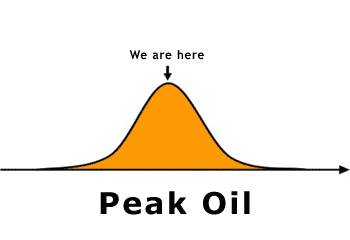The Peak Oil Crisis: Parsing 2014
MAY 14, 2014
By Tom Whipple
Some 15 years ago when the current concept of peak oil was posited, it was all going to be simple. Somewhere in the early part of the 21st century oil production was going to reach a peak and start to decline. Shortages would develop and prices would spiral upwards. But we should know by now nothing is simple. Peak conventional oil actually arrived on time circa 2005 and has remained on a rough production plateau ever since. Oil prices went flying up from the $20 a barrel we saw 15 years ago to $140 before demand destruction set in, leading to crude prices settling around $100 a barrel.
High priced oil sent much of the global economy into the tank where it still struggles to eke out small gains amidst incessant hopes for a rebound. Demand for the new high priced oil products fell in the advanced countries – partially from gains in efficiency and partly because large segments of the population could no longer afford to use them in the accustomed manner.
The five-fold increase in oil prices produced other reactions. The international oil companies were soon rolling in money which led to a capital spending spree to find and extract more oil. Much of massive increase in capital expenditures, however, went to fund costly deep sea drilling as most of the remaining dry land oil fields are now firmly in the hands of the national oil companies. Sadly, the big jump in drilling expenditures in the last eight years found just enough oil to keep global production steady, but did not increase global supplies of conventional oil.
The most visible “benefit” of high oil prices was that it permitted oil companies to go after the expensive-to-exploit tight (shale) oil/gas deposits and the fracked oil “revolution” was born. U.S. production of fracked oil and natural gas soared by nearly 3 million b/d; which as it turned out was enough, when combined with the drop in demand from the US and the other OECD countries, to meet the increase in global demand for oil which has averaged roughly 1.25 million b/d each year recently.
So, for the time being, we have a balance. The OECD’s demand has been trending down: the surplus has been taken up by increases in Asian demand; lower production in several OPEC countries due to political disturbances continues; and global depletion of existing oil fields continues to drop by some 3-4 million b/d each year. The markets are balanced out by a large increase in fracked oil and an increase in unconventional hydrocarbons such as natural gas liquids and lease condensates. For several years now, this balance has worked fairly well as world oil prices have remained around $100 per barrel, but now we come to 2014.
The very cold weather not only consumed an inordinate amount of our natural gas reserves, but also slowed the drilling of new oil and gas wells in the northern states. North Dakota’s production in March was the same as in November so there was no growth in Bakken shale oil production during the four winter months. It is clear to everyone but the most optimistic that the rapid increases in US shale oil production will come to an end within the next few years and it seems likely that production increases in 2014 will be less spectacular than in recent years. Some independent analysts believe that the peak in U.S. shale oil production could come within the next 24 months. This year’s production should give some good insight into just when peak U.S. shale oil may come.
Last winter several of the major international oil companies announced that they could no longer afford the accelerated pace of capital expenditures that resulted in some $3.5 trillion being spent to explore and drill for conventional oil in the last ten years. It is this massive expenditure that has kept conventional oil production steady, but now is coming to an end. Within the next few years, we are likely to see drops in conventional production as the pace for exploring and developing new oil fields contracts.
On top of the geologic problems, the political situation in several oil producing countries seem likely to get worse before the year is out. We have already lost substantial oil production from Syria, Egypt, Yemen, South Sudan, and Iran. Iraq, where production is still growing, is sinking into anarchy. Unless a more stable political situation emerges in Baghdad soon, the fighting is almost certain to spread into the country’s oil producing provinces before much longer. Only the Iranian nuclear negotiation, the prospects for which fluctuate daily, seems to offer any hope for increased oil production from the Middle East. Even this is still a great unknown. An agreement could result in increased Iranian oil exports, while failure of the talks will likely lead to increased tensions and more sanctions, especially if Tehran resumes a quest for nuclear weapons.
There are a lot of factors currently in play that could have a major impact on oil markets. The rate of global depletion from existing oil fields is increasing as production shifts to more fast-depleting deepwater and shale oil wells. The weather forecasters say El Niño is returning this summer which means higher global temperatures and more oil and gas consumption for cooling. The Ukrainian situation is far from settled and has the potential to disrupt global oil and gas flows. One such disruption would be an increasing share of Russian oil and gas production going to China at the expense of the EU. China is engaged in mini oil wars with Japan and Vietnam over offshore drilling rights. Governments are slowly becoming more concerned about air pollution/climate change and are starting to take concrete steps to slow fossil fuel burning.
It is too early to call 2014 a pivotal year, but by December we may have a much better appreciation on what the future has in store.







